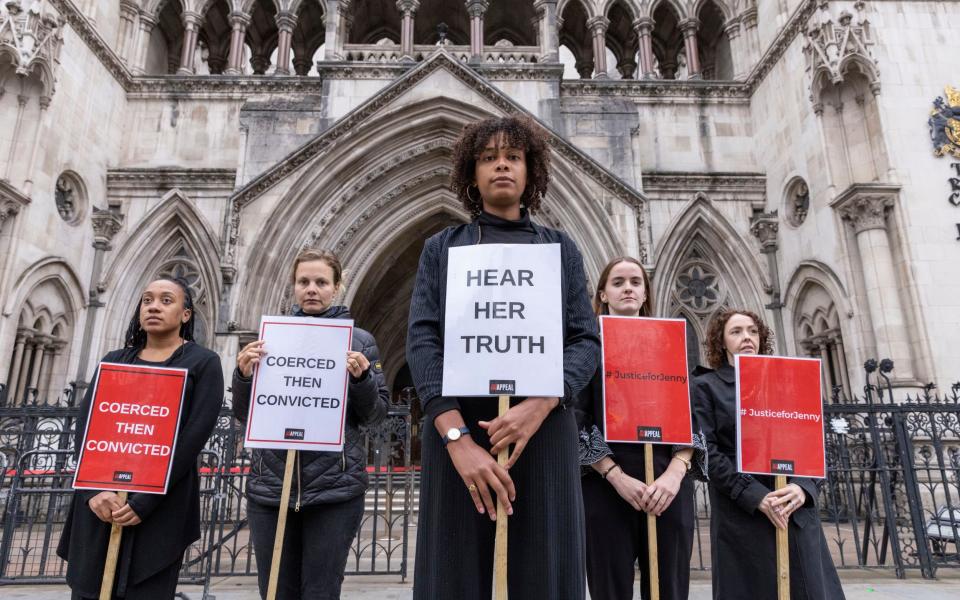Coercive control: why this mother’s heartbreaking story is back in the courts

It is four years to the month since Jenny* was sentenced to six years in prison for seriously harming her newborn baby, leaving him with cracked ribs, skull fractures and bleeding on the brain that almost cost him his life.
She told the court that she had caught her cardigan on a cupboard while preparing her son’s feed, dropping him onto a concrete floor. But the explanation could not account for the severity of his horrific injuries – and did not wash with the jury.
Collapsing in the dock as their guilty verdict was read out, Jenny could only plead “I didn’t do it”, before she was led away.
On Thursday October 28 the mother-of-three will tell the Court of Appeal that it was in fact her violent ex-partner – the baby’s father – who caused the infant’s injuries after punching her while she was holding the child.
It was, ironically, only in prison that Jenny felt safe enough to reveal that she had been unable to tell the truth in court, where she had to sit in the dock alongside her abusive ex – her co-defendant in the case, who was acquitted on a lesser charge.
“It was a matter of survival,” she says now. “I was there under his watchful eye. He controlled my every move and thought.”
In a letter to her previous legal team, four months after she was convicted, she described his campaign of terror, which saw her subject to frequent beatings and rape, locked up, deprived of food and sleep and urinated on – an experience amounting to ‘torture’ according to one expert psychologist.

Jenny, whose real identity we are protecting, describes her ex partner as a “Jekyll and Hyde figure” – an outwardly charming and funny real estate worker who was a vicious bully behind closed doors. “He would smile for everyone but for me it was the devil’s eye,” she says.
If the violence was horrific, the mental abuse was just as terrifying. “He controlled everything; what I wore, who I spoke to, when I put the kettle on.”
Now, this landmark case has the potential to change the way coercive control is understood by the courts – and the impact it can have on a defendant’s ability to put forward the truth at trial.
There have been a number of cases where the Court of Appeal has recognised coercive control as a factor in offending, including the high profile case of Sally Challen, who had her conviction for murdering her husband downgraded to manslaughter, after fresh evidence showed that she was a victim of his abuse.
Emma Torr, legal director of charity Appeal, explains: “Where [Jenny’s] case differs is we will be asking that judges consider the impact coercive control has on an innocent person’s ability to give instructions to their legal representatives, in light of the potentially grave consequences for their safety if they tell the truth at trial.”
It is rare for the higher court to examine a case where an applicant is effectively asking to change their testimony. But in her fight to clear her name, Jenny hopes judges will consider the exceptional circumstances, including the severity of the abuse which, if disclosed in court at the time, she believed would have endangered herself and her children.
Her legal team will present a dossier of fresh evidence to judges, including contemporaneous medical and police records that support her account that her partner punched her on the night in question – and reveal a horrific history of abuse the authorities failed to act on.

Naime Sakande from Appeal says: “Jenny was tormented by her abuser, let down by the police and then re-traumatised by the court process. This appeal is an opportunity to put things right.”
It was while shopping in 2014 that Jenny bumped into the man who would go on to make her life a living hell. He lived with a mutual friend and invited her to dinner.
At the time, Jenny, now in her mid-30s, was studying business and marketing at college and in the process of setting up her own company. She was recently separated and initially charmed by this “charismatic and kind” new man.
As they dated, however, he “became more and more present at my home, slowly leaving his belongings and turning up unannounced, declaring his love.”
Looking back, there were other warning signs. He would demand to see her Facebook account or check her phone, wanting to know her whereabouts, but always with a knack of explaining away her concerns.
Then came the physical abuse. “He’d apologise after lashing out – sometimes crying and asking for another chance. Unfortunately I fell for it.”
Jenny was happy when she fell pregnant but her boyfriend did not want to keep the baby and, if anything, the abuse ramped up. “He threatened to kill me several times and I stopped talking to the people I loved in order to protect them.”
On one occasion he stripped her naked and held her at knifepoint. Another time he flung her from a first floor window and after one row, he locked her and her two older children from a previous relationship out of the house, forcing them to sleep in the car.
Her business suffered and she dropped out of her studies. Even her finances were brought under his control and after falling into arrears on her rent, she lost her home.
When the baby was born, her boyfriend turned up at the hospital, high on drugs. “I took him to the family room where he assaulted me,” recalls Jenny. A woman at reception later gave her the number for a women’s refuge: the only time throughout her harrowing ordeal that anyone recognised her as a victim.
Indeed, in the course of two years, the police were called to the couple’s home on 11 occasions, including four between her arrest and the trial. But not once was Jenny interviewed out of earshot of her partner, despite her visible bruises.
Evidence to be presented by her lawyers shows that after her arrest Jenny was taken to hospital and diagnosed with ‘post-concussion syndrome’. Earlier, witnesses reported to the police that they heard her shout “you hit me” to her partner, who tests showed was high on crack cocaine at the time.
By the time of the trial she had moved out of their home, but her ex tracked her down, broke into her flat and insisted on driving her to and from court – which made it even harder to tell the truth when she took to the stand.
“Coercive control is underpinned by fear,” explains Jane Monckton Smith, professor of public protection at the University of Gloucester and author of In Control: Dangerous Relationships And How They End In Murder.
“If you don’t separate the person who is the source of fear from the person who is terrified, you won’t get the truth. For victims it is about managing the consequences – they are in survival mode. To admit abuse is a very high-risk strategy because if the system does not protect them, the consequences could be fatal.”
This means delayed reporting is a common feature of coercive control, which was made a criminal offence in England and Wales in 2015.
Almost 60 per cent of women in prison have experienced domestic abuse, according to the charity Women in Prison. It was only after being diagnosed with PTSD and meeting other survivors while serving her sentence that Jenny was able to disclose the trauma: “I came across so many women who were in the same situation. If my appeal is successful I hope it will open doors for other victims to have an opportunity to say their truth,” she says.
As Sakande points out: “This troubling case begs the question – how many other victims are being criminalised because they don’t have confidence that the public authorities will protect them?”
Jenny was released on licence in April 2020 after having her 10-year extended sentence reduced to five on appeal, and regularly sees her son, who lives under the legal guardianship of his maternal grandmother. Fortunately, he has suffered no long term impact from the injuries he sustained as a baby. A happy, active boy, he loves dinosaurs and painting, and dreams of becoming a police officer when he grows up.
Due to the terms of her licence, Jenny is currently only allowed supervised contact with him – if she wins her appeal, not only will she be exonerated, but hopes she will finally be able to start rebuilding their relationship, after all these years of lost time.
